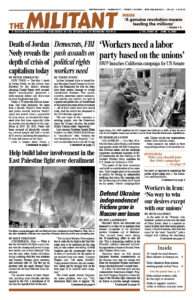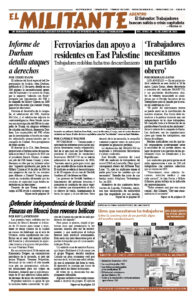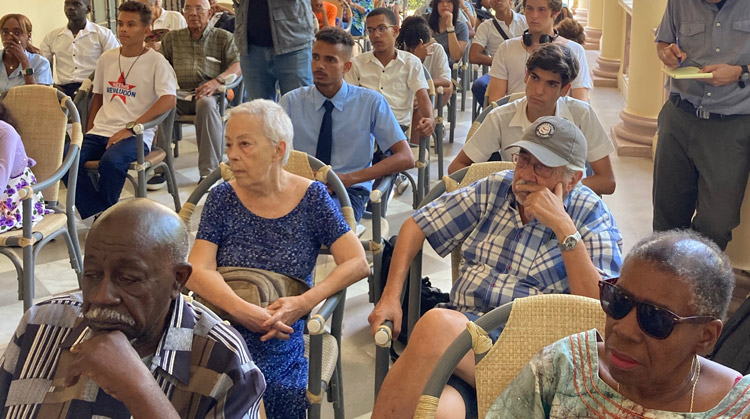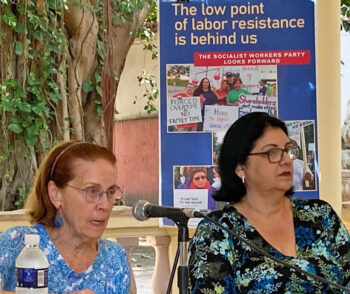The following are the remarks by Mary-Alice Waters at an April 25 presentation in Havana of the book The Low Point of Labor Resistance Is Behind Us: The Socialist Workers Party Looks Forward by Jack Barnes, Steve Clark and Waters. Waters is a member of the National Committee of the Socialist Workers Party and president of Pathfinder Press.
Held amid preparations in Havana and across Cuba to celebrate May 1, International Workers Day, the event was sponsored by the Central Committee of the Communist Party of Cuba and held at the national headquarters of the Cuban Institute for Friendship with the Peoples (ICAP). Participants were welcomed by Leima Martínez, ICAP’s director for North America. Noemí Rabaza, first vice president of ICAP, spoke along with Waters and chaired the meeting (see news article in the May 22 issue of the Militant).
Copyright © 2023 by Pathfinder Press. Reprinted by permission.
Thank you Noemí and Leima for your warm welcome and introductory remarks.
And a heartfelt thanks to all our compañeros and compañeras here at ICAP for hosting this special event today. On behalf of both Pathfinder Press and the Socialist Workers Party leadership, I also want to convey our appreciation to the comrades here representing the Central Committee of the party for their initiatives and efforts that made this meeting possible.
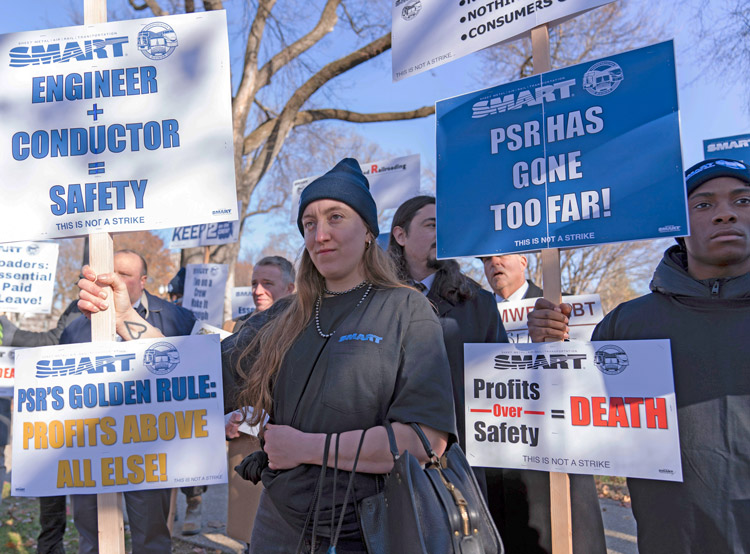
It’s a privilege to have an opportunity to discuss the class struggle unfolding in the United States and the revolutionary course open to us with an audience like this of young people, workers and communist leaders. We look forward to your observations, questions and opinions.
The book Pathfinder Press is presenting here this afternoon — The Low Point of Labor Resistance Is Behind Us: The Socialist Workers Party Looks Forward, whose authors are Jack Barnes, Steve Clark and myself — is about the political manifestations of the sharpening class struggle in the U.S. today. The centerpiece of the book is a document drafted six months ago by the SWP leadership. After three months of discussion and votes by party members in branches across the country, it was adopted in December 2022 by delegates to the party’s 49th constitutional convention.
The book is now being used from the Atlantic to the Pacific, as well as internationally, to educate and win workers and youth to a revolutionary working-class course of action.
The imperialist epoch
The class struggle in the United States, as in every country, doesn’t begin with its own historical, cultural and political idiosyncrasies. It begins as an integral part of the world.
We begin with the consequences of the fact that we live in the imperialist epoch, at a time when the seeming stability of the world order imposed by the victors of World War II continues to unravel. That process has been accelerated by the first major land war in Europe in almost eight decades. Trade, capital, and currency wars — often harbingers of armed conflicts to come — have sharpened. A renewed arms race, including nuclear weapons, is unfolding. Jew-hatred is once again on the rise worldwide, in word and deed. And the dominant imperialist power is in relative decline, with no replacement in the wings.
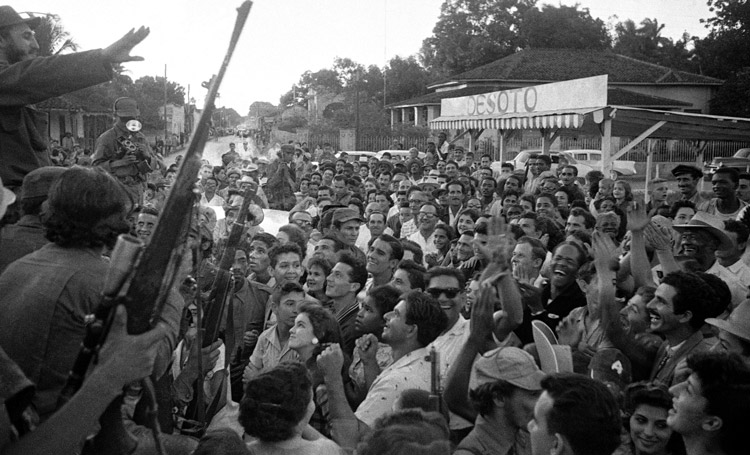
Amid the breakdowns, conflicts and wars that are coming, only one thing is certain. Unless the working class and its allies develop the confidence and consciousness that we must take the power to wage war out of the hands of the capitalist rulers in the U.S. and around the globe, there will be another world war. A war of unimaginable consequences.
For the Socialist Workers Party this historical truth is not cause for despair. Such an apocalypse is not inevitable. It depends on the actions of the international working class and its political vanguard. It depends on us — all of us.
What’s more, we have one important advantage today over previous generations. The victorious socialist revolution in Cuba, made possible by workers and farmers under the leadership of Fidel, gives us a living example we can learn from. Fidel’s recognition in action from January 1959 onward that a genuine revolution — and the forging of a communist leadership — required reaching far beyond the thousands of men and women in uniforms of the Rebel Army and July 26 Movement. It meant leading the millions being won to the revolution. It meant organizing and mobilizing those whose uniforms, in Fidel’s words, “were the work shirts of workers and farmers and other men and women of the people.”
No leadership since Lenin and the Bolsheviks has understood and acted on that fact so confidently and so unswervingly as the leadership of Cuba’s socialist revolution. Fidel first and foremost.
These are historical facts that guide the political course of the Socialist Workers Party.
Response to intensified exploitation
Briefly, I want to point to four of the political assessments at the center of this book.
First. As the title affirms, in the past two years we’ve seen a small but important increase in the number and geographical distribution of industrial strikes, job actions and acts of proletarian solidarity. More significant than their size and number, however, is what’s driving them.
In many cases the issue for the workers on strike is not only, or even primarily, wages. They are demanding changes in the intolerable and dangerous conditions of work that take a heavier and heavier toll on health and family relations.
- issues of job safety, for example, when the bosses disable or refuse to install protective features on machinery, and demand workers perform jobs for which they have not received adequate training.
- 12-hour workdays of intense labor with few breaks, sometimes six or even seven days a week.
- contracts that penalize workers if they are absent even one day due to sickness.
- forced overtime and irregular shifts leaving no time for family, for rest, recreation, union or social activity. Workers call them “divorce shifts,” and “suicide shifts.”
To give this reality its proper name — it’s the result of the owners’ intensification of the exploitation of labor. Some of the social consequences of this profit-driven assault are shown by charts you’ll find in this book.
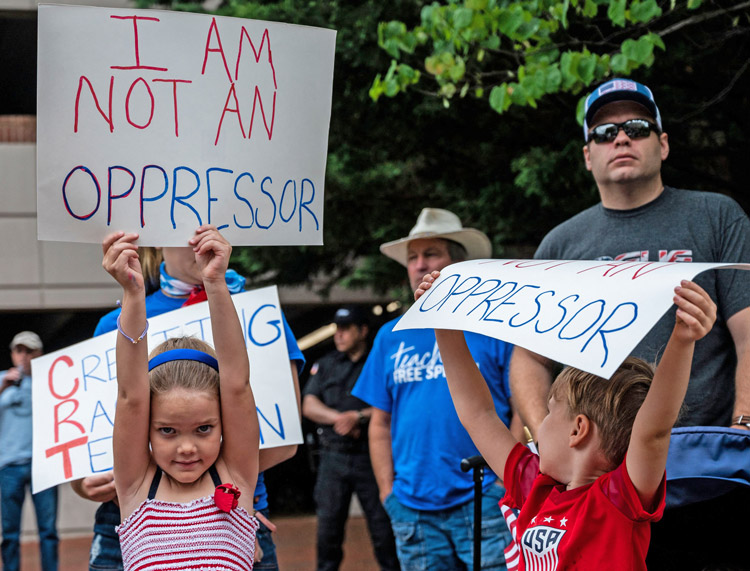
Inflation-adjusted wages have been almost flat for half a century and have begun sliding again the past three years. Life expectancy in the U.S. has fallen to the lowest level in a quarter century. The birthrate stands at less than half of what it was in 1950. Suicide rates have soared among adolescents, working farmers, and veterans of Washington’s wars in Afghanistan, Iraq and elsewhere. Drug use is now the leading cause of death for men in their prime working years, while alcoholism is again increasing, and gambling addiction is at all-time highs.
Starting and maintaining a family is increasingly beyond the reach of young men and women in the working class and among other exploited and worse-off middle layers. Apartment rents and mortgage payments are on the rise, as are prices for food, gas, health care, schooling, child care and other basics.
The freight train derailment last February in East Palestine, Ohio, which was widely reported here in Cuba and elsewhere around the world, captures many elements of today’s social catastrophe: tens of thousands of gallons of toxic chemicals were spilled over a huge area, endangering the lives and livelihoods of many thousands of working-class and farm families. It was not an “accident.” It was due to nothing but the rail owners’ drive to increase their profit rate. One of the safety features, a heat sensor, which would have warned crew members of a problem in time to stop the train, had been calibrated to render it useless.
More and more workers are saying “Enough!” to the unbridled power of the capitalist owners. They’re finding each other increasingly ready to fight back, and eager to discuss how to win. The idea that safety and job conditions — questions of life and death — should be under the control of the workers themselves gets a broader hearing.
To say the low point of labor resistance is behind us is not a prediction about the pace or scope of new battles on the horizon. It tells us what has already happened, the political opportunities that are opening up, and what to prepare for.
I’ll give one other concrete example that registers what has changed. Last weekend members of the Socialist Workers Party participated in the annual Los Angeles book fair, which draws tens of thousands of working people and youth. In the course of two days, they sold almost 90 subscriptions to our weekly newspaper, the Militant, and some 235 books. The best seller was the title we’re discussing here today in Havana. In short, they sold as many books and subscriptions in two days as they had sold in two months a year earlier. And the numbers would have been higher had they not run out of both books and papers.
Sharpening class divisions
Second. There is a deepening social and political polarization in the U.S. on numerous questions. These divisions register above all sharpening class divisions. The well-remunerated professional and middle-class meritocracy is pressing to impose its class values and meeting strong resistance from broad layers of working people. To mention a few examples:
- The burdens spawned by capitalist-fueled social ills often fall heaviest on women, especially in the exploited classes. There can be no road to ending women’s oppression without dealing with the social crises bearing down on families of the working class and addressing the challenges and responsibilities women shoulder for care of family members and as the bearers of new life. The bourgeois and leftist middle-class misleaders of organizations claiming to defend women’s rights, however, obfuscate the roots of women’s oppression in class society. They ignore the family and social issues that must be addressed and largely reduce the fight for women’s equality to abortion access. They then further reduce it to an electoral issue in hopes of winning votes for the Democratic Party. Women’s emancipation — which is impossible without a woman’s access to medically safe and legal control over reproduction — is inseparable from the working-class fight to create the material and social conditions that will enable women and men to realize our full humanity. That is the political battle we must win.
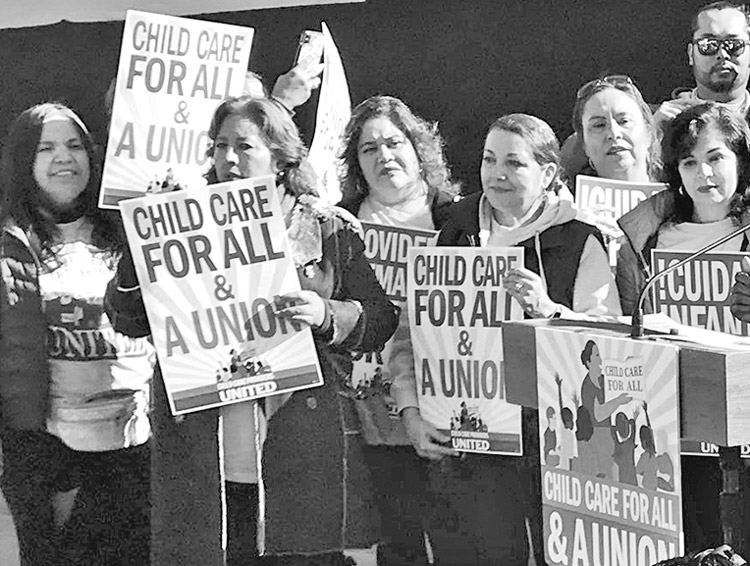
- Fueled by horrendous mass shootings in schools, churches, synagogues and shopping centers in recent years, many who call themselves “progressives” blame “backward” workers and farmers for clinging to their guns. They campaign against individual gun ownership as the cause of mass shootings and demand new restrictions or outright bans on the purchase and possession of guns. But guns are not the cause of these events. They are a product of the social crises produced by capitalism and the stresses that tear apart tens of millions of families.
- There are heated confrontations between parents and school administrators over the imposition of classroom programs that separate children by skin color and teach those whose skins are white that they are racists by birth. On the panel at the front here displaying photos from the book we’re discussing, you’ll find a picture of two young girls holding up signs saying, “I’m not an oppressor!” It captures the political content and intensity of these clashes.
- Another flashpoint is the expansion of “gender-fluid” schooling for children — even as young as kindergarten — teaching them that the sex they were supposedly “assigned” at birth is irrelevant. They are neither male nor female, they’re told, and can choose what they want from a long list of “genders.” Teenagers in the throes of the sexual misery of adolescence are urged to undergo “gender reassignment” surgery and hormone therapy. Confrontations over male transgender athletes competing in women’s sports have become another battlefront. Anyone defending the biological fact that there are two sexes risks becoming the target of social media mobs libeling them as “transphobes.”
- These conflicts, and many others, are not primarily an expression of divisions within bourgeois politics, although they are often exploited by bourgeois politicians hoping to divert attention from the fundamental issues and rustle votes. As the SWP resolution underscores, “Whatever the camouflage,” these conflicts “ultimately reflect class divisions.”
Defend constitutional freedoms
Third. Defending protections and freedoms enumerated in the U.S. Constitution, as the SWP resolution explains, “is at the center of the class struggle today.” These protections — under assault by the federal government, its political police such as the FBI, and both ruling political parties — are freedoms won by working people in class battles over two and a half centuries, including one of the bloodiest civil wars in history.
The U.S. Constitution originated as the constitution of a mercantile bourgeois republic. The working-class vanguard doesn’t politically defend or support it. Inscribed in that constitution, however, are hard-won written protections against abuses and the abridgment of a number of freedoms by the capitalist state.
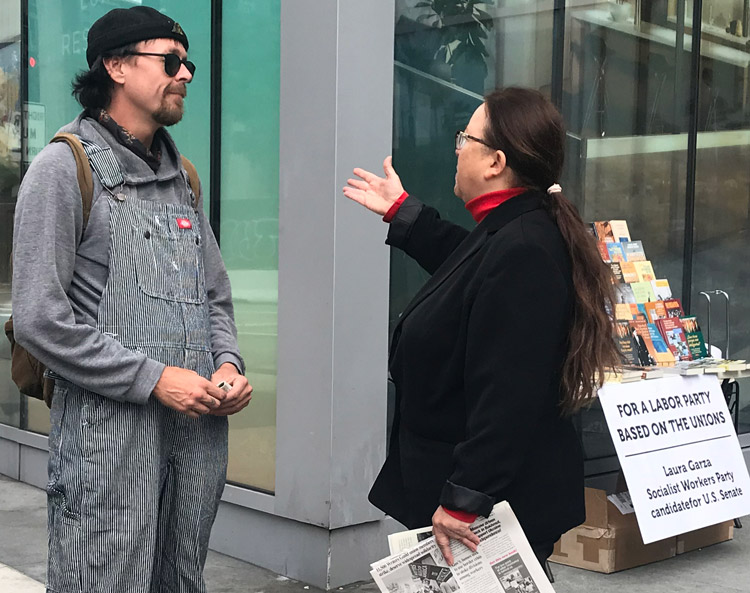
The First Amendment incorporated in the Constitution states, “Congress shall make no law respecting an establishment of religion, or prohibiting the free exercise thereof; or abridging the freedom of speech, or of the press; or the right of the people peaceably to assemble and to petition the government for a redress of grievances.”
“A well regulated militia, being necessary” the Second Amendment says, “the right of the people to keep and bear Arms shall not be infringed.”
Other amendments guarantee the “right of the people to be secure in their persons, houses, papers, and effects, against unreasonable searches and seizures.” In criminal proceedings, the Sixth Amendment guarantees the right to trial by a jury of one’s peers, the right to a defense attorney, and the right to confront your accusers and see the evidence being presented against you.
Whenever these freedoms are abused — whether the target is a former U.S. president, or a small family shop owner victimized for affirming their religious beliefs — class-conscious workers must speak out. No matter who is the target to begin with, we know from history that the precedent set by any breach of such protections will be used sooner or later to go after trade unions, workers on strike, working-class parties and organizations of the oppressed.
In the 1930s, when genuine fascist forces with world connections were growing in the U.S. and demanding the right to assemble, the Socialist Workers Party defended their right to do so. And when 20,000 Nazi supporters filled Madison Square Garden in New York City in February 1939, some 50,000 workers responded to the call issued by the SWP to answer that threat — not by reinforcing illusions in capitalist courts and legislative bodies, but in action and on the streets.
Contrary to what some on the left light-mindedly claim, there is no growing fascist movement in the U.S. right now. Constitutionally protected freedoms are under assault above all today by the capitalist state, as well as privileged but relatively insecure professional and middle-class layers who consider themselves “progressives.”
University campuses have become breeding grounds for activities aimed at silencing fellow students and professors who disagree with your views. Whether under the flag of “cancel culture,” “critical race theory,” the anti-Jewish “Boycott, Divestment and Sanctions” movement or something else, these are reactionary forces alien to the working class and its allies.
Another registration of class polarization and unraveling of the bourgeois rule of law is the criminalization of political differences within the ruling class and its political parties. The Democratic Party majority of the House of Representatives voted twice to impeach Donald Trump during his presidency. Now the first of what will likely be multiple indictments of Trump for other alleged crimes or civil suits has been handed down. The House of Representatives, today Republican controlled, is preparing payback for President Joseph Biden and members of his family. And it won’t stop there. We’ve seen the consequences of this criminalization of opponents in bourgeois politics elsewhere in recent years. The example of Brazil is one that most of us are familiar with.
Building a working-class vanguard
Fourth. Forging a proletarian party.
In a discussion with a young visitor to the Pathfinder stand at the Havana book fair two months ago, I was asked: “Why do you put so much emphasis on the working class? Isn’t that exclusionary? Doesn’t it diminish the importance of the struggle against racism, patriarchy, transphobia, destruction of the environment?”
The answer I gave her was not complicated.
The working class itself is the most inclusive social formation in the U.S. or any other capitalist state. Tens of millions of working people are targets of racism, sexism and/or every other prejudice and form of oppression fomented by capitalist society and used to divide us, to set us against each other. Workers are actively engaged in defending themselves and each other, on and off the job, every day.
But that’s just the beginning of an answer. Only the working class, created by capitalism itself, has the social weight, economic power — and absence of any class stake of its own in capitalist exploitation and rule — to lead the political battle necessary to take state power and establish a government that defends the interests of working people, the vast majority of humanity.
Only the working class, leading its allies — “los humildes,” to borrow Fidel’s words — can build a new economic foundation for all social relations. A foundation that for the first time in millennia is not built on private ownership of the land and productive property, exploitation, and oppression by a small minority of wealthy ruling families. That’s the course presented in Labor, Nature, and the Evolution of Humanity: The Long View of History, a recently published companion to the book we are discussing today.
And — as the socialist revolution made by the workers and farmers of Cuba confirmed — it is only through what will be titanic class battles to take power out of the hands of today’s rulers and begin the transformation of society that a vanguard of millions can be forged. Only along that road will millions of human beings, shaped by capitalist society, transform themselves as they fight to transform their world.
The greatest obstacle working people face is overcoming the view of ourselves drummed into us by capitalist society from the day we are born. As Malcolm X expressed it, we don’t need to be awakened to our oppression. We need to be awakened to our worth. To what we are capable of achieving.
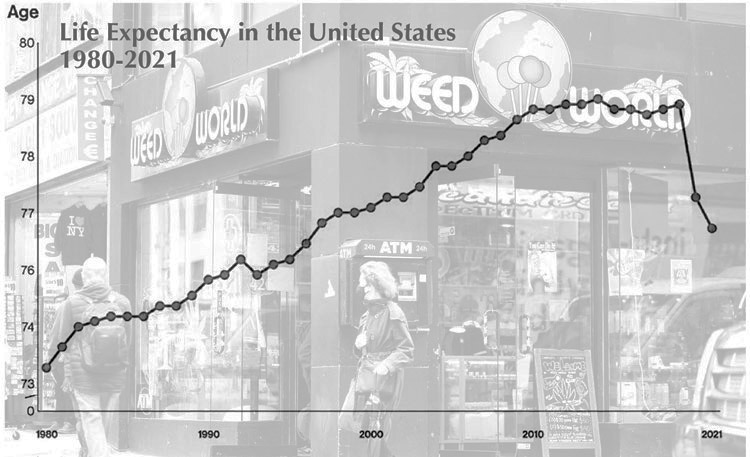
A socialist revolution in the U.S. is inconceivable without organizing workers to build, extend, and strengthen the basic defense organizations of our class, the trade unions. It is impossible without learning how to use that union power to advance the interests of working people. It is impossible without the fight to transform the unions into instruments of class struggle, wielded by class-conscious, battle-tested workers.
As part of that growing consciousness, the working class needs not only union democracy and solidarity. Above all, we need to break from subordination to the parties of capital — in the U.S., the Democratic and Republican parties first and foremost — and find our own political voice. We need a labor party built on the unions. A party that advances a working-class foreign policy too, one starting not from class-collaborationist loyalty to one or another of the conflicting capitalist states, but from the needs of our class at home and abroad.
These are not tasks for the future. They are tasks for today that can only be accomplished by a party that is proletarian in composition and social milieu as well as program and leadership.
Communist continuity
The course of the Socialist Workers Party has not been invented by us. It goes back to the founding of the modern working-class movement. Our continuity is rooted in the materialist dialectics and historical outlook of Marx and Engels and their leadership of the working class from 1847 on. It’s a continuity that runs through Lenin’s leadership of the October Revolution and the opening years of the Third International. A continuity defended by Trotsky in his work to stay on Lenin’s course, forging a world communist movement based on truth not lies, in face of Stalin’s reversal of independent working-class politics and proletarian internationalism.
It’s a continuity that runs through Cuba’s socialist revolution led by Fidel. Through leaders of the working masses like Che, Maurice Bishop and Thomas Sankara, who acted on that example. And through lessons learned across our own century of class-struggle experience in the United States, from the founding of the first Communist Party there in 1919, to today.
For us, the defense of Cuba and Cuba’s socialist revolution is not only an act of international working-class solidarity, as important as that is. It is inseparable from our revolutionary course in the U.S. We must win substantial sectors of the working class in the imperialist bastion to see that the bosses’ hatred, fear and lies about the Cuban Revolution are in fact an extension of their hatred, fear and lies about toilers inside the U.S.
The revolutionary capacities of workers and farmers in the United States today are as utterly discounted by the ruling families who control Washington as were those of the Cuban toilers who defeated them at the Bay of Pigs on the shores of Playa Girón. A lesson they will never forgive or forget.
The Low Point of Labor Resistance Is Behind Us: The Socialist Workers Party Looks Forward is a contribution to organizing and mobilizing those revolutionary capacities in action.
